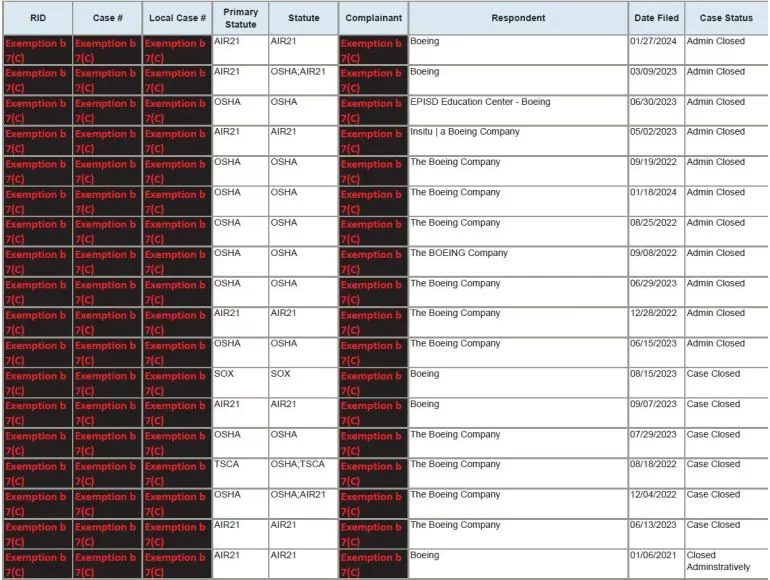The figures shed light on the extent of alleged retaliation by Boeing against whistleblowers as the Virginia-based company is facing mounting questions over its safety record and standards.
The Occupational Safety and Health Administration (OSHA), which handles claims of retaliation against workers who blow the whistle on their employer, received the complaints of retaliation between December 2020 and March of this year, according to a table of figures compiled last month by officials at the agency.
The documents, obtained exclusively by Al Jazeera via a freedom of information request, do not provide details of the alleged workplace violations or alleged retaliation by Boeing in each case.
However, 13 of the complaints were filed under a statute that protects whistleblowing related to aviation safety.
Fifteen of the complaints were filed under a statute related to workplace safety, two were filed under the category of fraud, and one related to the control of toxic chemicals.
Apart from monetary restitution being awarded in two cases, all of the complaints where an outcome was specified were closed without the agency taking action, according to the figures.
The most common reason for OSHA closing a complaint, cited in seven cases, was the whistleblower failing to make a report within the specified timeframe, which ranges from 30 to 180 days.
Among other reasons for finalising a case with no action, OSHA also cited lack of jurisdiction and lack of cooperation from the complainant.
Five cases were still being investigated or pending assignment.
The list of complaints is not necessarily exhaustive, as there is a range of US agencies that handle whistleblower complaints related to aviation, including the Federal Aviation Administration (FAA) and the National Transportation Safety Board (NTSB).
The documents also show that OSHA launched a review of the case of John Barnett, a former Boeing employee and whistleblower, after he was found dead last month from a suspected self-inflicted gunshot wound.
At the time of his death, Barnett was appealing OSHA’s dismissal of a 2017 whistleblower complaint with a higher adjudication body.
In an email sent on March 26, OSHA’s chief of staff, Emily Hargrove, told a colleague that the agency’s public affairs team were “asking that we review the decision back in 2017 to dismiss the case”.
“Jesse [Lawder, Deputy Assistant Secretary of Labor for Public Affairs] indicated the reasoning was because there wasn’t evidence that there was a violation of the underlying laws. Can we get a summary of that decision. He also is asking how often cases are dismissed based on that rationale. They also are asking if we made any safety and health issue referrals to FAA out of this complaint,” Hargrove wrote.
The outcome of OSHA’s review of the case is not referenced in the documents and remains unclear.
OSHA did not respond to requests for comment. Boeing did not respond to inquiries in time for publication.
The revelations come as the public testimony of a number of current and former Boeing employees is refocusing attention on the aircraft manufacturer’s allegedly hostile environment for whistleblowers and lax safety standards.
At a US Senate committee hearing on Wednesday, Boeing engineer Sam Salehpour testified that he had been threatened for raising concerns about gaps between key sections of the 787 Dreamliner.
“They are putting out defective airplanes,” Salephour said. “I have serious concerns about the safety of the 787 and 777 aircraft, and I’m willing to take on professional risk to talk about them.”
Another witness, Ed Pierson, a former Boeing engineer, accused the company of a “criminal cover-up” in the investigation of the midair blowout of a Boeing 737 Max 9 in January that prompted regulators to put a cap on the manufacturer’s production.
Before Wednesday’s hearing, Boeing denied there being issues with the structural integrity of its planes, saying that the 787 and 777 fleets had safely transported billions of passengers around the world during their time in service.
“Under FAA oversight, we have painstakingly inspected and reworked airplanes and improved production quality to meet exacting standards that are measured in the one-hundredths of an inch,” the company said in a statement.
“We are fully confident in the safety and durability of the 787 Dreamliner. We are fully confident in the safety of the 777, which remains the most successful widebody airplane family in aviation history.”
Following the hearing, Boeing said that retaliation at the company was “strictly prohibited”.
